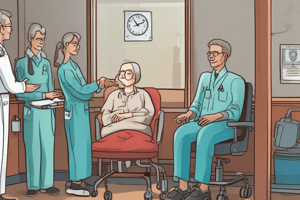Podcast
Questions and Answers
What is a crucial factor in achieving behavior change?
What is a crucial factor in achieving behavior change?
- Setting a specific timeline for change
- Sending frequent reminders to reinforce change
- Having a clear motivation to make a change (correct)
- Relying on external pressures to drive change
What is the primary purpose of weighing pros and cons in the behavior change process?
What is the primary purpose of weighing pros and cons in the behavior change process?
- To avoid feelings of ambivalence about change
- To involve others in the decision-making process
- To facilitate careful contemplation of change (correct)
- To make a quick decision about change
What is implied as a common behavioral barrier to effective patient-provider communication?
What is implied as a common behavioral barrier to effective patient-provider communication?
- Flagging emails as high importance (correct)
- Utilizing discussion boards
- Lack of health literacy
- Insufficient time for discussion
What is a key aspect of patient empowerment in health decision making?
What is a key aspect of patient empowerment in health decision making?
What is the significance of being 'ready' in the context of behavior change?
What is the significance of being 'ready' in the context of behavior change?
When a patient is in the pre-contemplation stage, what is a more effective approach to encourage change?
When a patient is in the pre-contemplation stage, what is a more effective approach to encourage change?
What factor can hinder effective patient-provider communication and decision making?
What factor can hinder effective patient-provider communication and decision making?
What is a potential consequence of using overly complex language with patients?
What is a potential consequence of using overly complex language with patients?
What is an important consideration when working with patients who are in the pre-contemplation stage?
What is an important consideration when working with patients who are in the pre-contemplation stage?
Why might a patient be hesitant to consider behavior change?
Why might a patient be hesitant to consider behavior change?
Which theory specifically focuses on how the environment influences behavior?
Which theory specifically focuses on how the environment influences behavior?
What are the two factors that influence behavior change in the Health Belief Model?
What are the two factors that influence behavior change in the Health Belief Model?
Which theory is most closely related to patient empowerment and health decision making?
Which theory is most closely related to patient empowerment and health decision making?
What is the primary focus of the Health Belief Model?
What is the primary focus of the Health Belief Model?
According to the Health Belief Model, what motivates individuals to change their behavior?
According to the Health Belief Model, what motivates individuals to change their behavior?
At which stage of the behavior change process do individuals typically begin to weigh the pros and cons of a particular decision?
At which stage of the behavior change process do individuals typically begin to weigh the pros and cons of a particular decision?
What is a characteristic of individuals in the contemplation phase of behavior change?
What is a characteristic of individuals in the contemplation phase of behavior change?
What is the primary goal of the preparation phase of behavior change?
What is the primary goal of the preparation phase of behavior change?
What is implied as a potential outcome of effective patient-provider communication?
What is implied as a potential outcome of effective patient-provider communication?
What is a key aspect of health decision making in the context of behavior change?
What is a key aspect of health decision making in the context of behavior change?
What is a common challenge patients face when transitioning from the preparation stage to the action stage of behavior change?
What is a common challenge patients face when transitioning from the preparation stage to the action stage of behavior change?
Why is the action phase of behavior change critical in health decision making?
Why is the action phase of behavior change critical in health decision making?
What can healthcare providers do to support patients in the preparation stage of behavior change?
What can healthcare providers do to support patients in the preparation stage of behavior change?
What is a consequence of not addressing the behavioral barriers that patients face in the action phase?
What is a consequence of not addressing the behavioral barriers that patients face in the action phase?
What is the significance of patient empowerment in the context of behavior change?
What is the significance of patient empowerment in the context of behavior change?
What is the primary challenge in facilitating behavior change in a dental practice?
What is the primary challenge in facilitating behavior change in a dental practice?
How can dental professionals influence patient behavior in a short amount of time?
How can dental professionals influence patient behavior in a short amount of time?
What is a critical aspect of driving behavior change in a dental practice?
What is a critical aspect of driving behavior change in a dental practice?
Why is it essential to involve the entire dental team in behavior change efforts?
Why is it essential to involve the entire dental team in behavior change efforts?
What is a key consideration when developing behavior change strategies for patients?
What is a key consideration when developing behavior change strategies for patients?
How can dental professionals adapt their behavior change approach to accommodate the constraints of a dental practice?
How can dental professionals adapt their behavior change approach to accommodate the constraints of a dental practice?
What is the primary benefit of involving the entire dental team in behavior change efforts?
What is the primary benefit of involving the entire dental team in behavior change efforts?
Why is it challenging to facilitate behavior change in patients?
Why is it challenging to facilitate behavior change in patients?
What is the role of dental professionals in facilitating behavior change?
What is the role of dental professionals in facilitating behavior change?
What is the significance of sustainability in behavior change strategies?
What is the significance of sustainability in behavior change strategies?
What is the primary drawback of a fix-it approach in patient care?
What is the primary drawback of a fix-it approach in patient care?
What is the primary goal of shared decision-making in healthcare?
What is the primary goal of shared decision-making in healthcare?
What is the role of healthcare providers in facilitating behavioral change?
What is the role of healthcare providers in facilitating behavioral change?
What is a crucial factor to consider when developing patient-centered care plans?
What is a crucial factor to consider when developing patient-centered care plans?
What is the primary benefit of considering a patient's unique life context in healthcare?
What is the primary benefit of considering a patient's unique life context in healthcare?
Flashcards are hidden until you start studying
Study Notes
Effective Patient Engagement
- A fixed approach to behavior change is not effective in patient care; instead, healthcare providers should engage in shared decision making with patients to understand their unique life context and priorities.
- Patients must be encouraged to take an active role in their behavior change, identifying their own motivations and priorities.
Overcoming Patient Ambivalence
- Patients may be ambivalent about changing their behavior, unsure of what to do or whether to make a change.
- Healthcare providers can facilitate patient motivation by asking open-ended questions, helping patients weigh pros and cons, and exploring their priorities and concerns.
Theories of Behavior Change
- The Social Cognitive Theory highlights the role of environmental factors in influencing behavior change.
- The Health Belief Model suggests that perceived threat and perceived benefits of behavior change influence an individual's decision to adopt healthy behaviors.
- The Theory of Planned Behavior emphasizes the importance of contemplation, preparation, and action in behavior change.
Stages of Behavior Change
- Pre-contemplation: patients are unaware of the need for behavior change or do not consider it important.
- Contemplation: patients are aware of the need for change but are undecided or weighing pros and cons.
- Preparation: patients intend to take action but are still planning and preparing.
- Action: patients are actively engaged in behavior change.
- Maintenance: patients work to sustain behavior change over time.
Applying Behavior Change Theories in Dental Practice
- Healthcare providers should prioritize patient-centered communication, taking into account patients' unique life contexts and priorities.
- Dentists and dental hygienists can use the theories of behavior change to inform their approach to patient education and counseling, encouraging patients to take an active role in their care.
- Effective behavior change strategies in dental practice involve collaboration, empathy, and a focus on sustainable, patient-centered care.
Studying That Suits You
Use AI to generate personalized quizzes and flashcards to suit your learning preferences.




